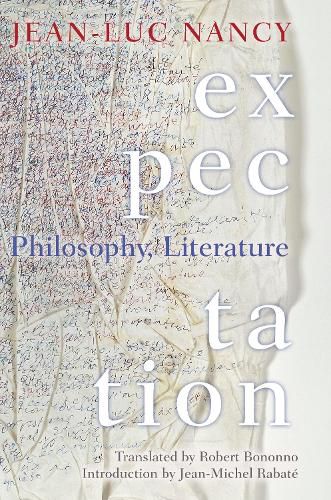Readings Newsletter
Become a Readings Member to make your shopping experience even easier.
Sign in or sign up for free!
You’re not far away from qualifying for FREE standard shipping within Australia
You’ve qualified for FREE standard shipping within Australia
The cart is loading…






Expectation is a major volume of Jean-Luc Nancy’s writings on literature, written across three decades but, for the most part, previously unavailable in English.
More substantial than literary criticism, these essays collectively negotiate literature’s relation to philosophy. Nancy pursues such questions as literature’s claims to truth, the status of narrative, the relation of poetry and prose, and the unity of a book or of a text, and he addresses a number of major European writers, including Dante, Sterne, Rousseau, Hoelderlin, Proust, Joyce, and Blanchot.
The final section offers a number of impressive pieces by Nancy that completely merge his concerns for philosophy and literature and philosophy-as-literature. These include a lengthy parody of Valery’s La Jeune Parque, several original poems by Nancy, and a beautiful prose-poetic discourse on an installation by Italian artist Claudio Parmiggiani that incorporates the Faust theme.
Opening with a substantial Introduction by Jean-Michel Rabate that elaborates Nancy’s importance as a literary thinker, this book constitutes the most substantial statement to date by one of today’s leading philosophers on a discipline that has been central to his work across his career.
$9.00 standard shipping within Australia
FREE standard shipping within Australia for orders over $100.00
Express & International shipping calculated at checkout
Expectation is a major volume of Jean-Luc Nancy’s writings on literature, written across three decades but, for the most part, previously unavailable in English.
More substantial than literary criticism, these essays collectively negotiate literature’s relation to philosophy. Nancy pursues such questions as literature’s claims to truth, the status of narrative, the relation of poetry and prose, and the unity of a book or of a text, and he addresses a number of major European writers, including Dante, Sterne, Rousseau, Hoelderlin, Proust, Joyce, and Blanchot.
The final section offers a number of impressive pieces by Nancy that completely merge his concerns for philosophy and literature and philosophy-as-literature. These include a lengthy parody of Valery’s La Jeune Parque, several original poems by Nancy, and a beautiful prose-poetic discourse on an installation by Italian artist Claudio Parmiggiani that incorporates the Faust theme.
Opening with a substantial Introduction by Jean-Michel Rabate that elaborates Nancy’s importance as a literary thinker, this book constitutes the most substantial statement to date by one of today’s leading philosophers on a discipline that has been central to his work across his career.